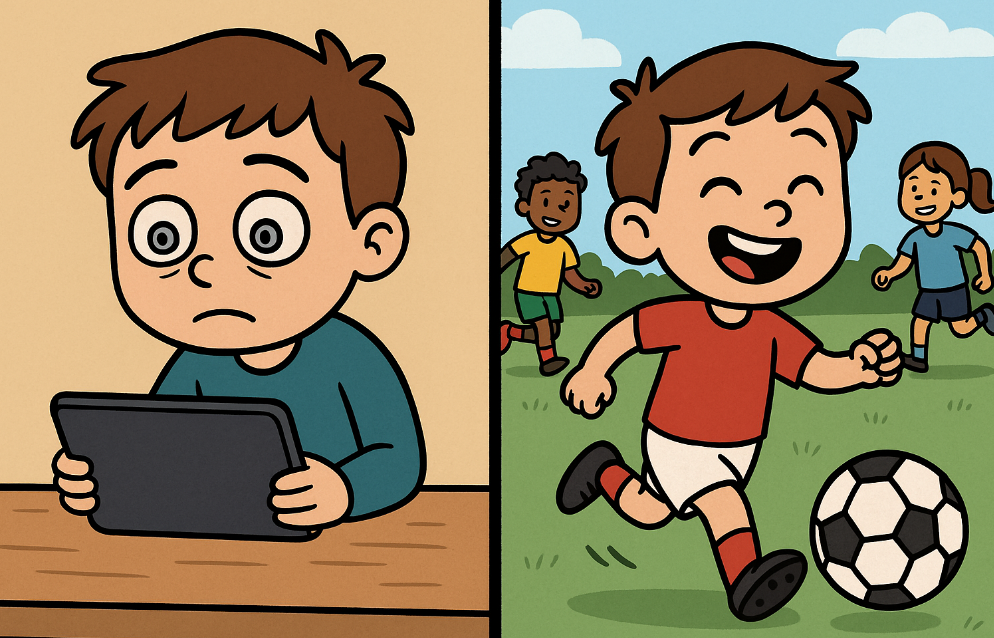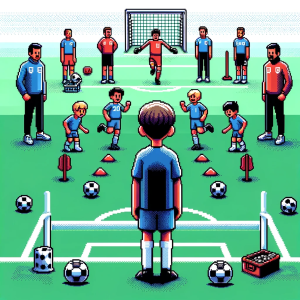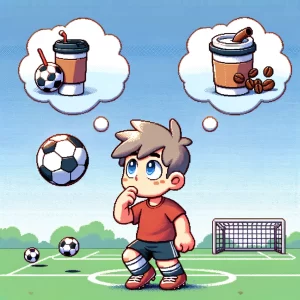
Soccer vs. Screen Time: Mental Health on the Line
If you have children like my sons, it’s an ongoing struggle. Probably THE major flash point in our house. Brawl Stars vs. drills?
If you’re a coach, parent, or club leader, you’ve likely seen it: young players distracted, disengaged, or simply glued to their phones. In a time where screen time often wins, new research out of China offers a hopeful—and scientifically backed—alternative: soccer. Not just soccer as a sport, but as a source of joy, confidence, and connection that can protect against internet addiction in young players.
A recent study involving over 570 Chinese school-aged soccer players found a powerful link between enjoyment of soccer, emotional self-confidence, and reduced internet dependence. The takeaway? If kids truly enjoy playing soccer, they’re more likely to thrive both on and off the pitch.
The Research in a Nutshell
The study, published in Frontiers in Psychology, explored how soccer participation affects internet addiction (IA) among kids aged 8 to 15. Here’s what researchers discovered:
- Enjoyment matters most. When kids enjoy playing soccer, they’re more engaged, and that enjoyment alone is tied to lower levels of internet addiction.
- Confidence is key. Kids who love soccer also report higher emotional self-efficacy—basically, they’re better at managing their feelings, especially stress and frustration.
- Teamwork builds resilience. The more frequently and meaningfully kids participate in soccer, the more it improves their emotional well-being and reduces the need for digital escape.
Put simply: joyful soccer play → stronger emotions → less screen dependence.
Let’s Break It Down: Three Key Building Blocks
1. Soccer Enjoyment Is More Than Just Fun
Enjoyment isn’t fluff—it’s fuel. The study found that when kids genuinely enjoy soccer, they’re more likely to:
- Stay active and stick with training programs
- Form stronger social bonds with teammates
- Develop healthier habits around technology
Coaching Tip: Make practices playful, competitive, and rewarding. Celebrate effort, not just outcomes. If it’s fun, they’ll come back—and that matters more than you think.
2. Emotional Self-Efficacy: Teaching Kids to Handle the Game of Life
Think of emotional self-efficacy as a player’s “mental touch.” When kids enjoy soccer, they build belief in their ability to bounce back from frustration, whether that’s missing a penalty or being left out of a group chat.
Real-World Application:
- Use soccer to model coping: “How did you handle that mistake?”
- Encourage self-reflection post-game: “What did you learn about yourself today?”
This builds lifelong skills that extend far beyond the field.
Participation Builds Identity—and Reduces the Need for Escape
The research shows that frequent participation in soccer helps kids find meaning, routine, and connection—three things that reduce the risk of screen addiction.
In fact, soccer taps into the same “reward circuits” in the brain as addictive behaviors do—but in a healthy way. It gives kids dopamine, confidence, and social feedback—all without a screen.
For Clubs:
- Offer structured, low-cost programs for beginners.
- Ensure your environment is welcoming to all kids—not just the top-tier athletes.
Why This Matters Now
Internet addiction is a growing public health issue, affecting kids’ sleep, grades, and relationships. Coaches and clubs are on the front lines—not just of youth development, but of youth mental health.
This study gives us more than just hope. It gives us a playbook.
Action Steps for Coaches and Clubs
Here’s how you can apply this research right now:
- Foster enjoyment: Run drills that spark joy, not just discipline.
- Build emotional skills: Talk about feelings, challenges, and bouncing back.
- Boost participation: Create routines that kids want to stick with.
And remember: Soccer isn’t just about building better players—it’s about building stronger, more resilient young people.
Your Turn to Kick It Off
Let’s hear from you. How do you help young players fall in love with the game? Share your thoughts in the comments or tag us on social media.
Try these questions to get started:
- What’s one way you spark joy at practice?
- Have you seen a difference in players who participate more often?
- How do you talk about mental health with your team?
Let’s grow the game—and our players—together.



